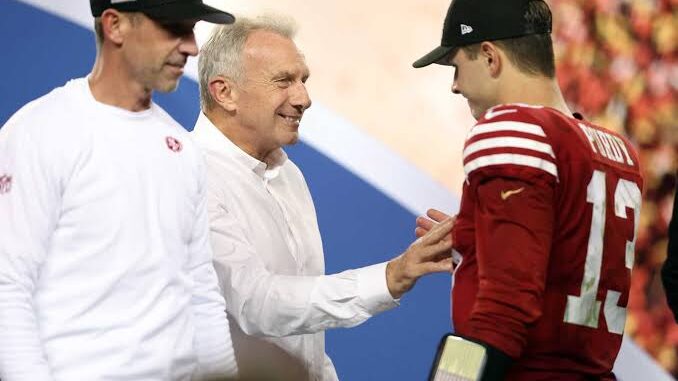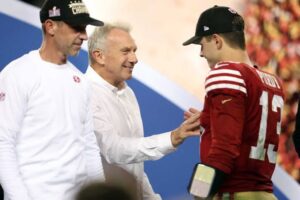
Brock Purdy Sparks Controversy: “I Love Joe Montana, But He Was Never the Best QB to Me Because He’s Got the Most Losses”
San Francisco 49ers quarterback Brock Purdy has set off a firestorm of debate in the NFL world with his recent comments about Joe Montana, a franchise icon and one of the most celebrated players in league history. Speaking on a popular sports podcast, Purdy gave a nuanced take on Montana’s legacy, praising the Hall of Famer’s contributions to the game but controversially downplaying his status as the greatest quarterback of all time.

“I love Joe Montana, don’t get me wrong,” Purdy said. “What he did for the game and for the 49ers is legendary. But to me, he’s not the best QB because, well, he’s got the most losses. That’s just how I see it.”
While Purdy’s comments were not intended as an outright criticism, they quickly ignited a heated debate among fans, analysts, and former players about the criteria for greatness in the NFL.
The Legacy of Joe Montana
To understand the controversy, it’s essential to recognize Joe Montana’s place in NFL history. Widely regarded as one of the greatest quarterbacks of all time, Montana played 16 seasons in the league, 13 of them with the 49ers. He led San Francisco to four Super Bowl victories in the 1980s and earned three Super Bowl MVP awards along the way. His postseason performances, highlighted by clutch moments like “The Catch” in the 1981 NFC Championship Game, cemented his reputation as a player who thrived under pressure.

Montana’s career statistics are also remarkable. He passed for over 40,000 yards, threw 273 touchdown passes, and had a passer rating of 92.3, which was considered elite during his era. However, Purdy’s comments bring attention to a less-celebrated aspect of Montana’s career: his losses.
Montana had notable playoff exits, including a 49-3 blowout loss to the New York Giants in 1986 and a crushing defeat to the Minnesota Vikings in 1987. He also suffered significant regular-season losses, particularly during the later stages of his career. These blemishes, while not uncommon for a quarterback with such a long career, have led some to question how much weight they should carry in evaluating his legacy.
Brock Purdy: The Rising Star
Purdy’s comments come as he is establishing himself as a cornerstone of the 49ers’ future. Drafted with the final pick in the 2022 NFL Draft, Purdy quickly became a sensation after stepping into the starting role and leading San Francisco to the NFC Championship Game in his rookie season. His poise, accuracy, and decision-making have drawn comparisons to some of the game’s greats, and he has earned the trust of both his teammates and the fanbase.
However, Purdy’s rise to prominence has also placed him under intense scrutiny. By speaking candidly about Montana, he has waded into a sensitive area for 49ers fans, many of whom hold Montana as the gold standard for quarterbacks.
The Metrics of Greatness
Purdy’s comments touch on a broader debate in sports: what defines greatness? Is it championships, individual statistics, consistency, or the ability to perform in clutch situations?

For Purdy, losses appear to weigh heavily in his assessment of quarterbacks. While Montana’s 4-0 record in Super Bowls is often cited as evidence of his superiority, his playoff losses and regular-season struggles in some years seem to have diminished his standing in Purdy’s eyes.
“I think greatness is about winning when it matters most,” Purdy explained during the podcast. “Montana was incredible in Super Bowls, but it’s not just about the big games. It’s about your whole body of work. And to me, losing those other games matters.”
Purdy did not specify who he considers the greatest quarterback of all time, but his remarks suggest a preference for players with fewer blemishes on their record.
The Reaction: Fans and Analysts Weigh In
Unsurprisingly, Purdy’s comments have sparked intense reactions from the NFL community.
Fans’ Reactions
On social media, 49ers fans expressed a mix of outrage, agreement, and amusement.
“How dare Brock Purdy disrespect Joe Cool? Montana built this franchise!” one fan tweeted.
“Purdy’s not wrong. Montana was great, but he wasn’t perfect,” another chimed in.
“This is hilarious coming from a guy who hasn’t even played a full season as a starter,” one critic wrote.

Former Players Respond
Several former players, including Montana’s teammates, have also weighed in. Jerry Rice, Montana’s favorite target and arguably the greatest wide receiver of all time, defended his former quarterback.
“Joe Montana was the ultimate competitor,” Rice said during a radio interview. “Losses are part of the game. What matters is how you bounce back, and Joe always did that.”
Former 49ers safety Ronnie Lott added, “I get where Brock is coming from, but Joe’s greatness isn’t up for debate. He defined what it means to be a champion.”
Analysts’ Perspectives
Sports analysts have taken a more measured approach, using Purdy’s comments as an opportunity to discuss the criteria for evaluating quarterbacks.
“Brock Purdy is entitled to his opinion, and it’s refreshing to hear a young player speak his mind,” said ESPN’s Stephen A. Smith. “But let’s be real—Joe Montana is in a class of his own. Four Super Bowls, no losses in those games. That’s what matters most.”
On the other hand, Fox Sports’ Colin Cowherd offered a different take. “Purdy’s not entirely wrong. If we’re talking about pure talent and consistency, there are other quarterbacks—like Brady, Manning, even Rodgers—who might edge Montana in some areas. It’s a fair discussion.”
Comparing Eras
One complicating factor in the debate is the difference in eras. Montana played in a time when defenses were more aggressive, and passing rules were less favorable to quarterbacks. Modern quarterbacks benefit from rule changes that protect them from hits and allow for higher passing efficiency.
Montana’s achievements came in an era where quarterbacks were often hit hard and played through injuries. Purdy, like all modern quarterbacks, operates in a more quarterback-friendly environment. This context is crucial when comparing players across generations.
What This Means for Purdy
While Purdy’s comments have sparked controversy, they also highlight his confidence and willingness to engage in difficult conversations. However, as a young quarterback with much to prove, he may have inadvertently placed additional pressure on himself.
Some fans and analysts have suggested that Purdy should focus on his own career before critiquing a legend. Others see his comments as a sign of a strong-willed competitor unafraid to speak his mind.

The Larger Debate
Ultimately, Purdy’s remarks about Montana are part of a broader conversation about how we evaluate greatness in sports. Is it fair to penalize players for losses, even when those losses occur in challenging circumstances? Should championships outweigh individual performance?
Joe Montana’s legacy is secure, but Purdy’s comments have reignited debates about the criteria we use to rank the all-time greats.
Conclusion
Brock Purdy’s candid remarks about Joe Montana have sparked a lively debate in the football world, challenging fans and analysts to rethink their perceptions of greatness. While his comments may be polarizing, they have also opened the door for a nuanced discussion about what it means to be the best.

For now, Purdy will need to focus on his own career and continue proving himself as the 49ers’ quarterback of the future. Whether he can one day approach the heights reached by Montana remains to be seen, but one thing is clear: Purdy isn’t afraid to challenge the status quo.
And in the NFL, that kind of boldness is often the first step toward greatness.
Leave a Reply